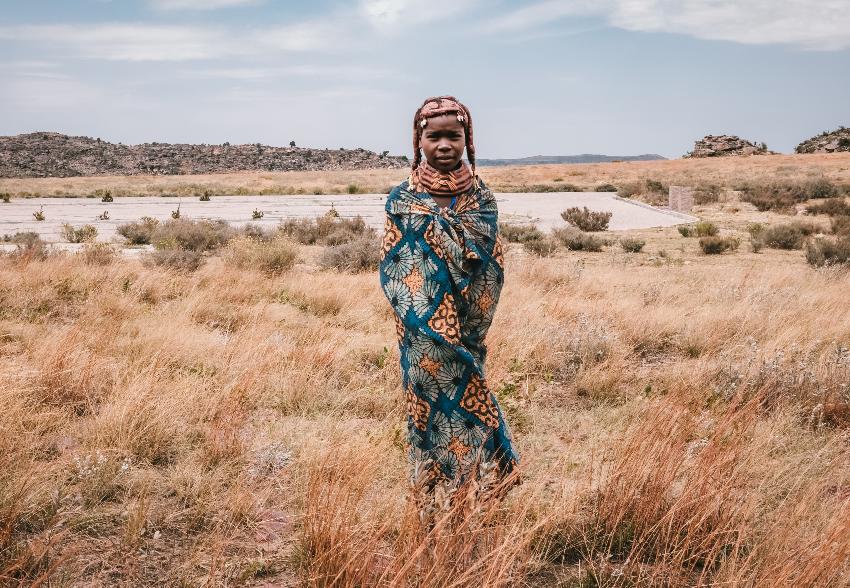

Angola: a country full of contrasts, with desert giant dunes, stunning rivers, misty mountains, and impenetrable jungles, with a huge diversity of traditional tribes barely known to the outside world.
That’s where we are heading in today's article in order to know more about Muwila women, their uses of plants, and how Scents from Nature is learning more about the pristine flora that exists in the South of Angola.
Muwila women, from the Muwila tribe (existing only in the South of Angola) have a deep understanding of local plant species and their traditional uses, which is a testament to their knowledge and experience in agriculture, medicine, and other aspects of their culture.
They rely on plant-based resources for their livelihood, including food, medicine, and raw materials for crafting and construction.
Women's involvement in agriculture and plant-based medicine also contributes to their economic empowerment and strengthens their social status within the community.
One important plant for Muwila women is the marula tree, which is highly valued for its fruit and oil.
Women collect marula fruit from the wild and use it to make a variety of products, including Marula oil, which is used for cooking, as a skin moisturizer, and as a hair conditioner. Marula oil is also a valuable commodity, and women can sell it at local markets for additional income.
Besides the Marula tree, some of the plants used by the Muwila tribe include the Moringa oleífera, used to treat malnutrition, skin diseases, and respiratory problems.
Additionally, another important Angolan tree, Ximenia americana, is used, as vegetable oil, for various purposes in the Muwila community, including cooking, medicinal, and cosmetic purposes.
The oil is known for its high nutritional value and is rich in vitamins, antioxidants, and essential fatty acids. The Muwila tribe also uses this oil to make soap, body creams, and other cosmetic products.
Apart from vegetable oils, the Muwila tribe also uses the leaves of the Lippia javanica (Wild Verbena) and Myronthamnus flabelliofolia (Resurrection Bush) plant to make incense.
Wild Verbena is commonly known as fever tea, and the leaves are crushed and burned to produce a fragrant smoke.
With regards to the Resurrection Bush, the leaves are mainly used during traditional ceremonies and rituals. The scent of the Resurrection Bush is earthy and slightly sweet, and it is highly valued by the Muwila tribe for its unique fragrance. The bush is also used for its medicinal properties, as it is believed to have healing properties for various ailments, including fever, malaria, and skin conditions.
Overall, the Muwila tribe's use of aromatic plants for incense and perfumes, and vegetable oils for nutrition and skin conditions, highlights their deep connection to nature and their knowledge of natural resources.
These plants' unique scents and functionalities have been passed down through generations and are an essential part of the Muwila tribe's cultural heritage.
These are just a few examples of the many plants used by the Muwila tribe for medicinal purposes. It's important to note that the use of traditional medicinal plants is a complex and nuanced practice and that different tribes and cultures may use the same plants in different ways.
At Scents from Nature, our team of agronomists is committed to utilizing this ethnobotanical knowledge to improve our understanding of native ancestral products, embedded in a storytelling potential.
We believe that traditional knowledge can offer valuable insights into the cultivation and conservation of plant species.
Our team has been working closely with local communities to identify and document traditional practices related to the cultivation and harvesting of native plant species.
By combining this knowledge with modern agronomic techniques (satellite tracking and irrigation control), we hope to develop sustainable plantation methods that can help preserve these plant species for future generations.
Additionally, our team is exploring ex-situ conservation methodologies to ensure the long-term viability of these plant species.
Through our research, we hope to start producing wild species and not depend fully on wild harvesting, while reintroducing these plants back to the wild, through the use of our greenhouses, in order to conserve this pristine flora and the local knowledge associated with it.
In conclusion, Muwila women's knowledge and experience in agriculture, medicine, and other aspects of their culture are a testament to their expertise and resilience.
Through their use of plant-based resources, Muwila women promote sustainable land use practices and contribute to community resilience and well-being. We, as a company, consider that their traditional knowledge of plant species, their uses, and their sustainable agricultural practices is an invaluable resource that must be recognized and respected as an essential aspect of their cultural heritage.